December 1847 saw the release of the debut novels of Acton Bell and Ellis Bell, published alongside each other in three volumes. We know them better as Anne Brontë and Emily Brontë, of course, and the novels were ‘Agnes Grey’ and ‘Wuthering Heights’.
This was an exciting period for Charlotte too, as her ‘Jane Eyre’, despite being written long after her sisters’ novels, had already been released two months earlier, and the siblings must, like all new authors, have been waiting excitedly for the reviews to roll in. Unfortunately, many of the opinions passed on the Brontës, or the Bells as they were known then, were highly unperceptive, and say more about the reviewers and the restrictive, often puritanical, nature of mid nineteenth century society than they do about the books.
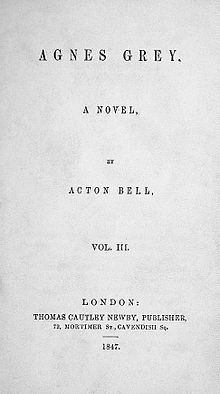
Let’s take a look at what some of the leading publications had to say about Anne Brontë’s ‘Agnes Grey’:
‘Agnes Grey is more level and more sunny [than Wuthering Heights which was also reviewed here]. Perhaps we shall best describe it as a somewhat coarse imitation of one of Miss Austin’s charming stories… The story, though lacking the power and originality of Wuthering Heights , is infinitely more agreeable. It leaves no painful impression on the mind – some may think it leaves no impression at all.’ (The Atlas)
This encapsulates one of the problems Anne had, her work was always compared with that of Ellis and Currer Bell – whose ‘Jane Eyre’ is also frequently mentioned in the review. The reviewer’s views are perhaps slightly undermined here by his inability to spell Jane Austen’s name correctly. The endless comparisons to ‘Jane Eyre’ can also be seen in the following review:
‘Of Agnes Grey, much need not be said, further than this, that it is the autobiography of a young lady during the time she was a governess in two different families; neither of which is a favourable specimen of the advantages of home education. We do not actually assert that the author must have been a governess himself, to describe as he does the minute torments and incessant tediums of her life, but he must have bribed some governess very largely, either with love or money, to reveal to him the secrets of her prison-house, or, he must have devoted extraordinary powers of observation and discovery to the elucidation of the subject. In either case, Agnes Grey is a tale well worth the writing and the reading. The heroine is a sort of younger sister to Jane Eyre, but inferior to her in every way.’ (Douglas Jerrold’s Weekly Newspaper)
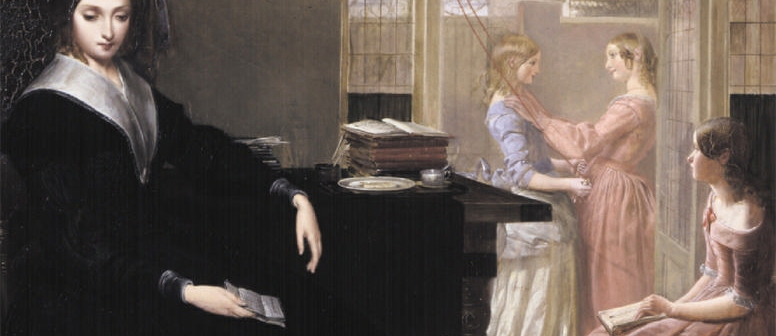
Anne must have been frustrated by the insinuations that she had in effect copied, or at least taken inspiration from, Currer’s tale of a governess ‘Jane Eyre’. They’re very different books, except for the occupation of their protagonist, and of course if there was any inspiration it must have been Charlotte who took it from Anne’s book which she had already read when she commenced work on hers.
‘The three Bells, as we took occasion to observe when reviewing Wuthering Heights’ ring in a chime so harmonious as to prove that they have issued from the same mould. The resemblance borne by their novels to each other is curious.’ (The Athenaeum)
Whilst there are superficial similarities between the novels of Anne and Charlotte Brontë, it seems more difficult to see a resemblance between ‘Agnes Grey’ and ‘Wuthering Heights’, except in their brilliance.
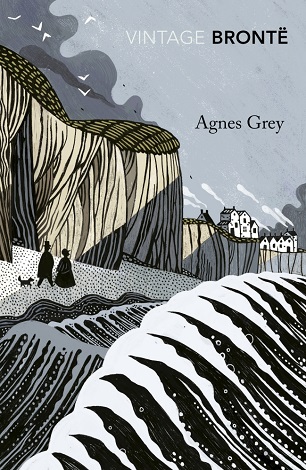
Overall, the reviews for ‘Agnes Grey’ were not damning, but they compared it unfavourably to her sister Emily’s work, or damned it alongside it for a coarseness that in reality it doesn’t possess. What the reviewers saw as coarse and unsuited to a novel, especially one which might be read, shock horror, by women, Anne saw as the truth, and the dissemination of truth was the most important thing of all to her. She addressed this in her preface to the second edition of ‘The Tenant of Wildfell Hall’, a book which had attracted large sales and fierce criticism alike:
‘When we have to do with vice and vicious characters, I maintain it is better to depict them as they really are than as they would wish to appear. To represent a bad thing in its least offensive light, is doubtless the most agreeable course for a writer of fiction to pursue; but is it the most honest, or the safest? Is it better to reveal the snares and pitfalls of life to the young and thoughtless traveller, or to cover them with branches and flowers? O Reader! if there were less of this delicate concealment of facts – this whispering of ‘Peace, peace’ when there is no peace, there would be less of sin and misery to the young of both sexes who are left to wring their bitter knowledge from experience.’
One particularly unperceptive review of the sisters’ work came at the worst possible time, as an American review arrived in the parsonage at the close of 1848, a time when Emily was dying and Anne too was gravely ill. Charlotte recounts the scene of tragic bathos as she read ‘The North American Review’ to her sisters:
‘What a bad set the Bells must be! What appalling books they write! Today as Emily appeared a little easier, I thought the Review would amuse her so I read it aloud to her and Anne. As I sat between them at our quiet but now somewhat melancholy fireside, I studied the two ferocious authors. Ellis, ‘the man of uncommon talents, but dogged, brutal, and morose’, sat leaning back in his easy chair drawing his impeded breath as best he could, and looking, alas! piteously pale and wasted; it is not his wont to laugh, but he smiled half-amused and half in scorn as he listened. Acton was sewing, no emotion ever stirs him to loquacity, so he only smiled too, dropping at the same time a single word of calm amazement to hear his character so darkly portrayed. I wonder what the reviewer would have thought of his own sagacity could he have beheld the pair as I did.’
Anne never lived to see the huge advance in the reputation of her books, and their author, that came later in the nineteenth century and on to today, but she would surely have been quietly satisfied that people now recognised and valued the truth of her words, and her powerful, moving way of expressing them.
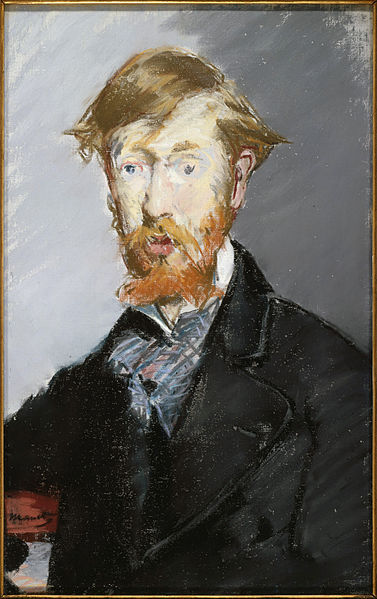
I was very pleased to see ‘Agnes Grey’ feature in a list of the best Brontë books read this year by the fantastic Brontë blogger Nicola Friar (incidentally, I will be creating a links page soon detailing the very best Brontë related blogs, there are so many great ones out there now), and we should also remember the very favourable impression the book left on the early twentieth century novelist George Moore:
‘Agnes Grey is the most perfect prose narrative in English literature… a narrative simple and beautiful as a muslin dress… We know that we are reading a masterpiece. Nothing short of genius could have set them before us so plainly and yet with restraint… If Anne Brontë had lived ten years longer she would have taken a place beside Jane Austen, perhaps even a higher place.’
Moore’s opinion is certainly worth taking notice of, after all he was an excellent novelist himself, and, unlike the Atlas reviewer, at least he knew how to spell the name Jane Austen!
If you’re thinking of writing a book review, on Amazon or elsewhere, please do remember that it will be there forever, and that somewhere there’s a flesh and blood author waiting to hear the verdict on the child born from their imagination; after all, a review is for life, not just for Christmas.
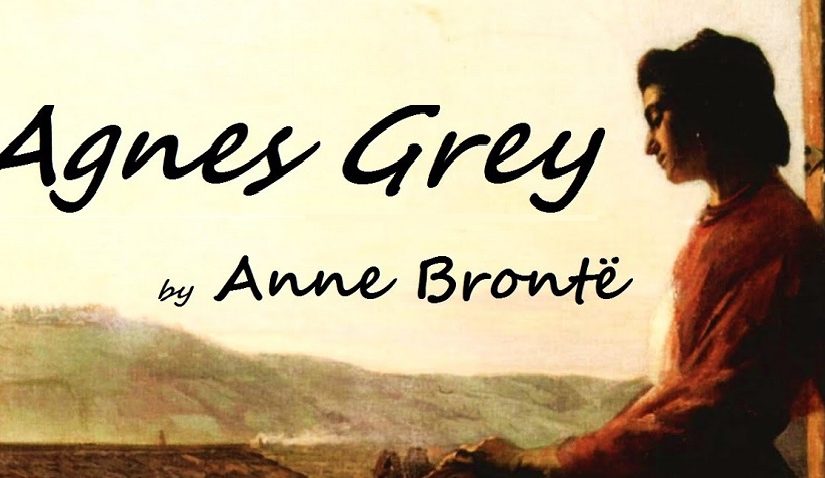
Looking forward to seeing the list of Brontë blogs and sites.
The quotations from contemporary reviews of Agnes Grey is illuminating; more of the weirdness of the Victorians than anything else. What is this fear of ‘coarseness’ that is ever present.
Amazing that Britain ruled the world for two centuries with a hiccup for Napoleon; they were so filled with self-importance and the sense of ‘mission’ and yet so lacking in humanity and reflection. I ‘confidence’ and righteousness. Thanks for the Blog. I am looking forward to visiting Haworth (hopefully before Anne’s decentennial (sp?) but am afraid there is nothing left except wall to wall tourists and a few skeletal buildings. And, of course, imagination and knowledge. Cheers. Mel